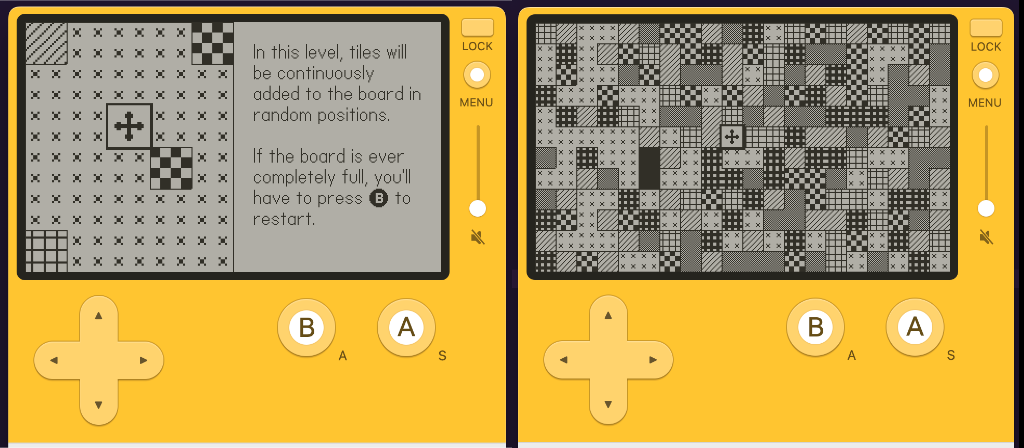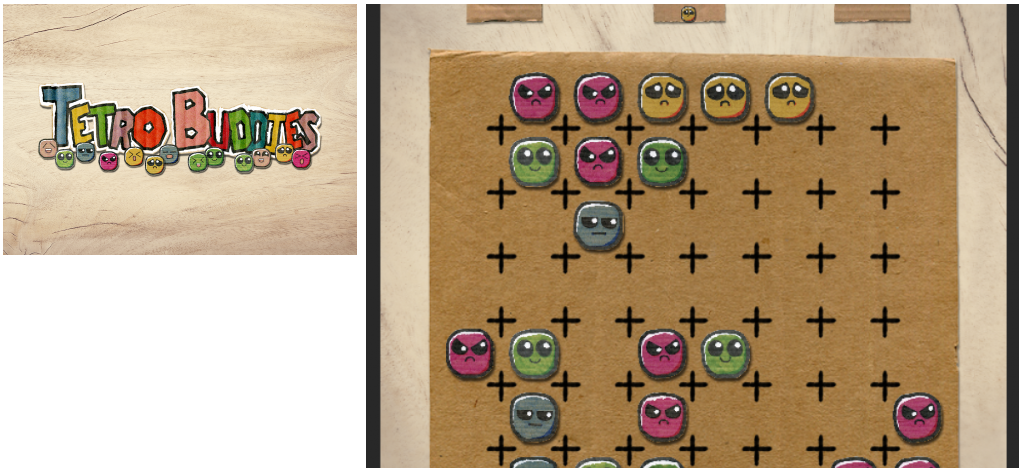Writing some Lua
I’m working on a playdate game. It’s sort of a mishmash of tile-matching mechanics, and attempts to get the crank working with various ideas I’ve had for square-grid manipulation. I’ve sort of thrown a bunch of ideas together and what I need to do now is decide how I’m going to focus it into an actual game. Currently there are both realtime “action puzzle” levels and also some more discreet puzzle levels that are not really designed so much as some tutorial and proof that puzzles could be designed pretty easily. I’m tempted to write a generator so I don’t have to do any level design, but I’ve gone down that road before, and once I’ve got the generator, I still have to pick levels that seem fun, and that’s usually where I crap out. I’ve mostly been focused on the action puzzle mode, which is what I really want to be the game, but if I’m being honest, I think the other mode seems maybe slightly more fun right now. I think I might try and think of ways to make the levels not be realtime, but still have recursive puzzles.

As I touched on in my last post, toward the end of last year and into the beginning of this one, I spent a bunch of time building some framework stuff for iOS grid-based games. I only mention this because now I’ve re-built a lot of that stuff in Lua for Playdate dev, which has me thinking lately about how I could re-use it in Pico-8, and maybe also in Love2D. The Love2D aspect is interesting because I could then target/publish back on iOS (in addition to desktops), bringing my development path pretty much full-circle. (I still definitely prefer Swift to Lua though, and have been daydreaming a bit about writing a Swift package that generates my Lua for me… that’s probably silly though.)
But no Unity
After publishing Thrive Digital last fall, I have yet to even install Unity on my new MacBook Pro. I think I may be “done” with Unity as a platform. (At least until I have another VR or AR project, but possibly not even then.) Unfortunately, this means a whole lot of my “in progress” projects are kind of abandoned at this point. That includes remakes of Action Chess and Go Tetris (which I’d been planning on calling Action Go when I do finally finish it), as well as a handful of prototypes and game jam games.
One of the jam games I thought was particularly promising and that I always meant to finish up was called Tetro-Buddies, and it had excellent art by August Brown.

Also in my Unity “in-progress” folder is Puzzle Prison, a game made for and targeting Google cardboard (no relation to Tetro-Buddies). I more or less abandoned Puzzle Prison around the time the first Oculus Quest came out. It was very near completion for a while, and I should probably have just released it. I actually showed Puzzle Prison at a number of events, and for a while it was my go-to demo whenever I wanted to show off VR on my phone. (It was a 3DoF Chain-Shot clone where the “puzzle was all around you”.)

I have been meaning to blog about Puzzle Prison for years. I even had an amazing OST made by musician Paths (who was calling himself DR00 at the time). The gameplay was… fine, but nothing special. I had all these ideas for making it more of a unique take, (mostly I just implemented a few additional block types, but I entertained plenty of other ideas) but none of the ideas really improved the gameplay much, and I think that had a lot to do with my never releasing it beyond TestFlight.
Now this article has become more about what I’m not doing than what I am, so let’s get back to that.
And some Action Puzzle game cataloging
The other thing I’ve been spending a lot of time on lately has been action puzzle game curation and Taxonomy. I have a relatively long blog post I’ve been working on, so I won’t go into it here, but of course action puzzle game taxonomy is a topic I’ve written about, and even felt compelled to present about, in the past. One piece of this is that I put together a relatively long list of action puzzle games on IGDB, mostly to make it easier to get feedback from fans of the genre about any that I may have missed or just don’t know about while putting the list together. I think there are a ton missing from the last 10-20 years, and I’d love for this to be as close to comprehensive as possible, but I’m not including any sequels or games that just don’t add anything to the design-space (although of course sometimes that judgement is subjective, so I’m erring on the side of inclusion).
One thing that’s decidedly missing from the IGDB list are smaller indie and hobbyist games. The list started not on IGDB, and the original is more comprehensive, and includes a bunch of iOS games not found on IGDB, a well as Pico-8 games. Of course it is possible to add games to IGDB, but I’m not sure that’s the best use of my time. The Pico-8 curation has been especially fun, because I recently bought an Anbernic RG351V, and have set it up to play all my favorite Pico-8 games, including some excellent Action Puzzle games like Pushamo, PullFrog, Bondstones, Drop Blop, TetraChess, and Sirtet. I definitely feel like I’ve barely scratched the surface on finding them.
Anyway, look for that blog post… sometime soon-ish.
